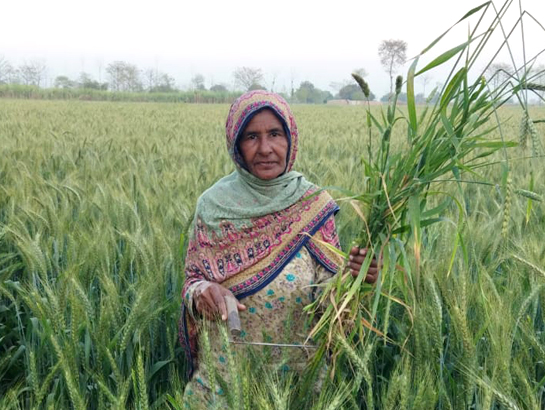The rapid scaling of zinc-enriched wheat is touching new heights in Pakistan. Wheat is the main staple crop, consumed by over 90 percent of the population, with an average per capita annual consumption of 87 kilograms, among the highest in the world. HarvestPlus and its public and private sector partners have implemented several innovative and strategic measures to increase the cultivation of zinc wheat varieties.
“Around 2.1 million farmers planted the zinc-enriched seed in Pakistan in year 2022, which is feeding around 13 million people in farming families with the nutrient-enriched wheat to overcome food insecurity and hidden hunger. These are conservative estimates and in addition, millions of people are consuming zinc enriched wheat purchased from the market. More than 90,000 metric tons of certified zinc-enriched wheat seed was available for the 2023-24 planting season in Pakistan”, Yaqub Mujahid, HarvestPlus Country Manager said.
Biofortification has been recognized as an easy, cost-effective, and sustainable strategy by Food and Agriculture Organization of the United Nations (FAO) to deal with micronutrient deficiencies, commonly known as “hidden hunger”. In Pakistan, more than 22 percent of women of reproductive age are zinc deficient. Punjab province with 24.1 percent has the highest proportion of women with zinc deficiency. Similarly, around 18.6 percent of Pakistani children under five have inadequate zinc intake, which is linked to stunting, impaired brain development, and poor immune function in the body.
“To eliminate hidden hunger among the most malnourished populations, HarvestPlus is working with a wide variety of stakeholders from the public and private sectors in Pakistan to popularize nutrient-enriched biofortified crop varieties. Zinc biofortification of wheat is one of the most suitable interventions to address zinc deficiency”, Mujahid, maintained.
“The initial catalyst to scale was the support from the Government in early generation seed production and a high quality, competitive, product developed through the CGIAR with subsequent new products added. Maintaining the scale is driven by market demand and promotion of biofortified wheat seed to farmers, grain, and nutritious foods to consumers in the marketplace. This includes several innovative activities like farmer field days, product launch events, seed promotion and value chain actor’s seminars, and use of digital technologies like social media platforms for demand creation.”, he said adding that the progress will further help in overcoming the malnutrition in rural and urban areas of Pakistan.
In Pakistan, so far five biofortified zinc wheat varieties have been released, which include Zincol 2016, Akbar 2019, Nawab 2021, Tarnab Rehbar, and Tarnab Gandum 1. Several other varieties are in the pipeline or testing.
Dr. Khawaja Masuood Ahmed, National Coordinator Nutrition and National Fortification Alliance at Federal Ministry of National Health Services, Regulation, and Coordination said, “a country where malnutrition costs Pakistan US$ 7.6 billion a year, growing biofortified crops is the most cost effective, feasible, and sustainable solution for nutritious and affordable diet for most of the population.”
